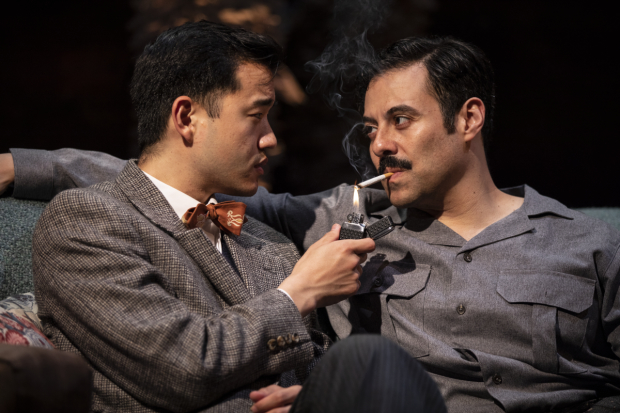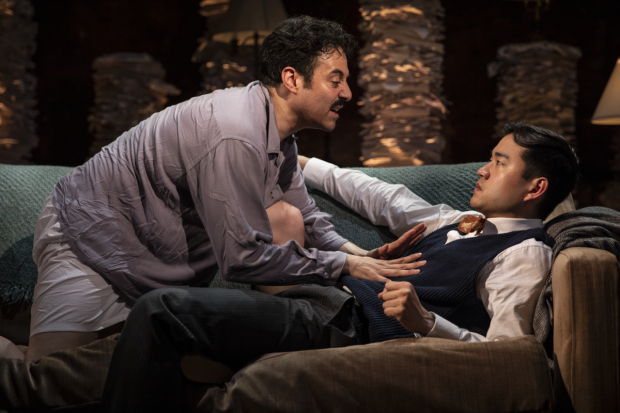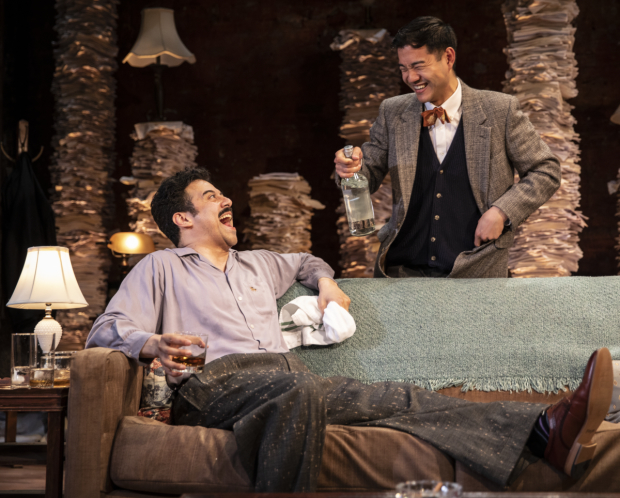The Gentleman Caller and the Sexual Desire Between Two Pulitzer-Winning Playwrights

(© Maria Baranova)
The Gentleman Caller, Philip Dawkins's new play about the relationship between playwrights William Inge and Tennessee Williams, fittingly takes place in the realm of memory. In the opening moments Williams stands slightly downstage and addresses us directly, just like Tom in The Glass Menagerie. "Here I must request that you engage your imaginations," he beseeches, "that most endangered of American qualities." If only Dawkins left more to our imaginations and more unsaid, this historical drama (now making its New York debut with Abingdon Theatre Company at the Cherry Lane Theatre) might really ignite.
Author of the hilarious and compassionate Charm, Dawkins rightly sees potential in the real drama between these two fabled dramatists: Although he would go on to win the Pulitzer Prize for Picnic, Inge (Daniel K. Isaac) is just a lowly critic for the St. Louis Star-Times in 1944, when he requests an interview with up-and-coming playwright Tennessee Williams (Juan Francisco Villa). Williams would earn widespread acclaim later that year for the Chicago debut of The Glass Menagerie, but at the time of this play he is just a prodigal son returned home, hungry for some publicity from the local paper. What begins as a professionally cordial interview (d)evolves within the hour into hot passionate sex.

(© Maria Baranova)
That's the first act finale, but how we get there is questionable. We feel neither the coursing electricity nor the twinge of danger that should portend a good sexual encounter between relative strangers. While Dawkins succeeds at writing Williams a series of bon mots (currency of the realm for homosexual playwrights), he's not as adept at crafting the subtext and silence that could make this play really hot. We understand that Inge is attracted to the glamor of his gentleman caller, but what attracts Williams to the uptight Inge? How does this moment transcend the bonds of professionalism and companionship to reach into the stratosphere of sexual-spiritual desire?
Dawkins buries these questions in an avalanche of words: From beginning to end, Williams never seems to stop talking, at times sounding like a life coach as he encourages Inge to release the playwright within. Villa attacks the role with the manic energy suggested by the text. He serves his gin dry and his jokes wet, grinning with delight at his own brilliance. He occasionally struggles to remember his lines; but in fairness, there really are a lot of them.
Isaac is appropriately tense as Inge, wallowing in the self-loathing of the closeted and desperate. He even buttons the last button of his double-breasted suit, lest some of his gay accidentally show (attractive and revealing period costumes by Hunter Kaczorowski). It is clear that he views Williams as inspiration and mentor, but the absence of sexual chemistry between our two protagonists feels like a lost opportunity to explore how gay relationships often defy easy categorization.

(© Maria Baranova)
Director Tony Speciale delivers an admirably physical staging of this talky play, but the tone occasionally slips into farce, with Williams spilling his drink all over the stage. It's amusing to watch, but detracts from what the characters are actually saying. Sara C. Walsh designs a surreal habitat for these literary creatures: Tall columns of paper surround the central playing space, each topped with a table lamp through which Zach Blane creates his incandescent mood lighting, which is unfortunately wasted on this lamentably unsexy scene.
In the absence of heat, we wait in anticipation for the drama that will surely come once Inge finds his confidence as a writer and supplants Williams at the center of the American theater before both are dismissed and derided. Dawkins gives us some of that in an epilogue that is unsatisfying as an ending, but also the best writing in the play. "Dramatically radical c*cksuckers will look back on us and sigh in shame, annoyed at our inability to predict the future and somehow magic it into our present," Williams spits with articulate rage. It forces us to sit up and pay attention, making us finally feel the fire that we've been missing for the last two hours.










